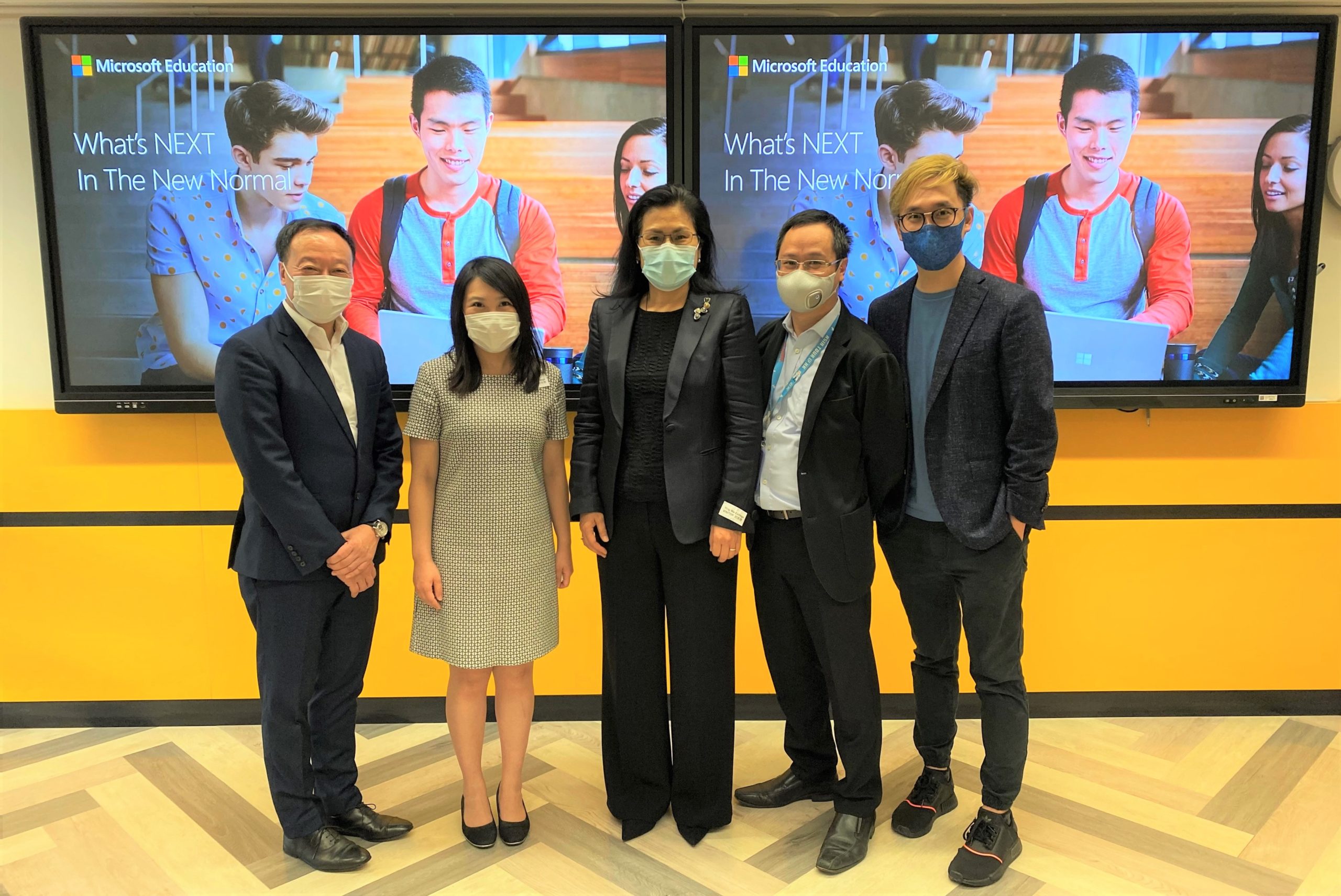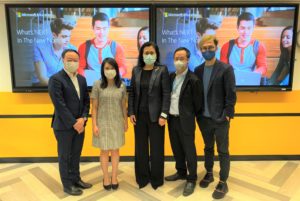This year, educators around the world have been testes and challenged like never before. In adapting to one of biggest shocks in the history of education, schools and universities have been forced to a sudden shift to out-of-school, remote and hybrid learning. With the threat of a generational gap in education, the new school term is an opportunity to reflect on the lessons of the crisis which has prompted a worldwide re-examination of education at all levels.
There are many lessons for educators to take from this experience, specifically on the use of new platforms and technologies and how they can help students to achieve more despite the COVID situation. At the annual Microsoft Education Forum themed “What’s Next in the New Normal”, Microsoft Hong Kong gathered the local learning community of school leaders, teachers, IT professionals to parents to share their experience of navigating these challenges and think about how we can collectively help students to learn and grow in the new normal.
Fred Sheu, National Technology Officer at Microsoft Hong Kong, said, “I have been inspired by my conversations with school leaders, teachers, and IT professionals as they define a new era of learning, one that is open-walled, student-centered, and unrestricted by traditional learning schedules or the classroom environment. As this academic year gets underway, it is clear that we are still in a transitional period in which schools and education systems are still determining the best path forward.”
“Microsoft is committed to enhancing the digital skills of educators to help our students become future-ready to embrace the digital era. We are doing this by providing the technology and equipping educators with essential skills for a new mode of teaching. This is helping to empower the education sector to navigate these challenges through an unprecedented transformation.”
Quality education in hybrid mode starts with right skills and support for teachers
The transition to remote learning at scale was a monumental undertaking. What schools struggled with most was providing teachers with enough support to roll out remote and hybrid learning experiences for all students sustainably.
“Nobody signed up to be a virtual teacher. Online pedagogy is more challenging than a simple switch to online classes. Teachers need to be equipped with the right tools and skills to provide a holistic learning experience for every student. This goes beyond video teaching and encompasses the whole learning journey as well as social and emotional learning,” said Mrs Shirley Duthie, Principal of The Education University of Hong Kong Jockey Club Primary School, a Microsoft Showcase School.
To facilitate engagement during remote learning, the school has been using Microsoft Teams and other apps integrated on the platform, such as game-based platform Kahoot! and interactive presentation tool PearDeck, to customize their lessons so social interactions is encouraged and can help improve students’ participation.
“Before COVID, going digital was a choice. But the pandemic has since made it a necessity. As schools reopened and moved towards a hybrid mode, we needed to reassess how to best use technology to complement our everyday teaching, and how we could provide equal access and support to students in need,” said Shirley.
The school now adopts a blended learning approach, where face-to-face interaction is complemented with technology that supports self-study at home. For example, using Flipgrid for Flipped Classroom, students are asked to prepare short video before lessons and teachers can review and facilitate discussion of the videos and lesson topics during class.
Technology as an integral part of education, beyond a quick fix for disruptions
Educators find the greatest success when pedagogy and technology are adapted to work together to encourage collaboration, engagement, and quality learning outcomes. Microsoft Innovative Educator Expert (MIEE) Fammy Wong of Yuen Long Merchants Association Secondary School shared how with the right tools, teachers are more confident in their ability to engage students and assess learning.
“One of the most challenging aspects for teachers when moving online was how our relationships with students changed when meeting only on screens. Teachers need to be mindful that students’ social needs must not be neglected. Microsoft Teams provided an ideal solution as its integration with host of other applications provide flexibility on how I can engage with students while I teach remotely,” said Wong. “For example, I’d like to do a quick poll before class for an emotional check-in, have casual chats with students or even roll out games and project to encourage interaction between students after class. It is also helpful for me to assess students’ engagement levels through students’ digital footprint and their actions on Teams, so I can identify students who are struggling or less engaged in class to provide additional support.”
Microsoft Teams and Power BI offer a significant advancement to the age-old pedagogical task of assessment. Once supplied with enough students’ data, this assessment tool also allows for analytics, giving Yuen Long Merchants Association Secondary School the ability to understand students’ performance more accurately.
“Now, even we are back to school, we continue to host different activities on Teams to supplement our in-person lessons in the morning. I can see this continue to be the norm as we move hybrid. The digital journey has enabled us to provide more tailored and personalized learning experience. Our Principal Yau Chi Leung also sees the potential and power of technology, and fully support the adoption of Microsoft Teams across the school,” added Wong.
Digital skills now fundamental to students’ lifelong success
Another successful integration of technology, Eric Chan, teacher at Ying Wa College & Microsoft Innovative Educator Fellow shared how students develop interest in STEM and self-learning attitude, all when technology is part of the classroom learning environment, beyond a tool to navigate current uncertainties.
“I follow the ‘Triple E’ principle when leveraging technology to engage, enhance, and extend my teaching. It is important to ensure that the technology we are using can help engage, but not distract, students in class. To enhance students understanding in complex concepts like AI, I have chosen Microsoft Azure Machine Learning platform, which allows students build models in a simplified way to inspire their learning interest. Also extending learning beyond walls of the classroom, I found projects a good way to help them connect these learnings with real-life scenarios,” said Chan.
Chan currently uses Microsoft Azure platform to prepare various AI learning activities for students that create better engagement. Looking ahead, he also plans to include game-based learning using Minecraft Education Edition to promote creativity, collaboration, and problem-solving in an immersive digital environment.
“This time of uncertainty has demonstrated how technology tool can help us connect with students, but it is more powerful when it moves from simply a system of delivery to a vehicle for collaboration and discovery. Integrating technology in classroom has helped inspire students’ interest in STEM and empower them to become more digital savvy. This is critical given digital skills are no doubt essential for students’ future success,” added Chan.
A beginning of a new model of education
The hybrid model combines the best of in-school and remote learning, with digital engagement. The response of educators represents much more than a quick response to the present challenges. While there are still challenges to address, we can see that when pedagogy is coupled with scalable technology for online and hybrid learning, it can help drive enhanced learning outcomes, increase well-being, and create a more fulfilling experience for teachers and students.
“Every child needs and deserves a great education. The new normal presents an opportunity for us to brainstorm a new way forward and to learn from each other. To help ensure the well-being and academic success of all students, we must reimagine the curricula, teaching and assessment practices, the role of teachers and students in the learning environment, and more. This is only the beginning of a new mode of education, and Microsoft is committed to empowering the Educator Sector every step of the way,” concluded Sheu.
(From left) Mr Fred Sheu, National Technology Officer at Microsoft Hong Kong, Ms Fammy Wong, teacher at Yuen Long Merchants Association Secondary School and Microsoft Innovative Educator Expert (MIEE), Mrs Shirley Duthie, Principal of The Education University of Hong Kong Jockey Club Primary School, Mr Eric Chan, Vice chairperson of STEM Education at Ying Wa College and Microsoft Innovative Educator Fellow and Mr Ben Chan, Education Industry Executive, Enterprise Public Sector at Microsoft Hong Kong shared how the education sector can collectively help students to learn and grow in the new normal.
###
About Microsoft
Microsoft (Nasdaq “MSFT” @microsoft) enables digital transformation for the era of an intelligent cloud and an intelligent edge. Its mission is to empower every person and every organization on the planet to achieve more.





